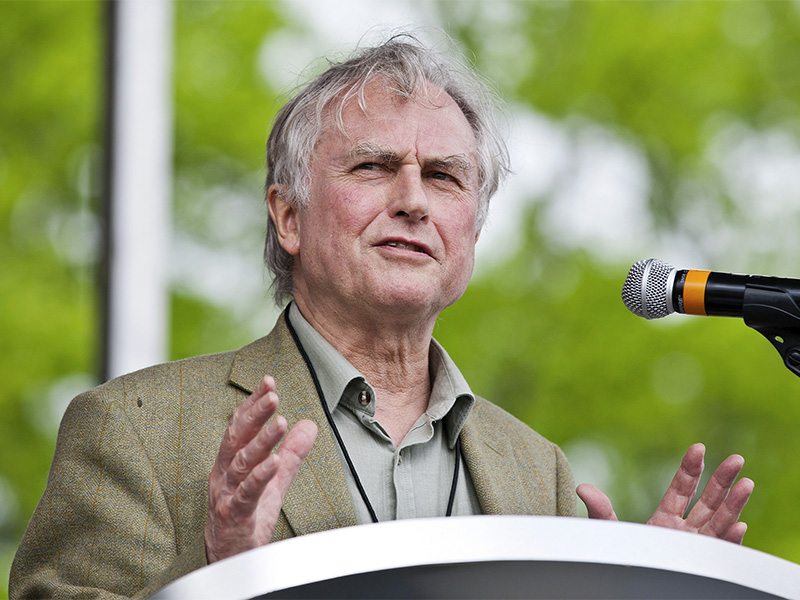(RNS) — Richard Dawkins, the famed evolutionary biologist and ardent critic of religion, found a new San Francisco-area venue to host his current book tour after his planned Berkeley appearance was abruptly canceled.
Dawkins, 76, was scheduled to speak Aug. 9 at a ticketed book signing and benefit for KPFA, a listener-supported Berkeley public radio station. But the station, citing “Dawkins’ abusive speech against Muslims,” notified ticket holders it was canceling the event in an email dated July 20.
[ad number=“1”]
On Thursday (July 27), Dawkins announced on Twitter that the event has been rescheduled on the same day 18 miles to the west at Book Passage, an independent bookstore in Marin County. It is no longer a benefit for KPFA.
Were you a victim of @KPFA’s sanctimonious hypocrisy? Ticket returned? SORRY. Short notice substitute event here: https://t.co/vlpvn7tqux
— Richard Dawkins (@RichardDawkins) July 27, 2017
KPFA has experienced a deluge of criticism for its cancellation of the Dawkins event, far beyond its many upset listeners. Dawkins’ allies — many of them famous scientists and public atheists — took to social media or other outlets to express their concern over what they saw as censorship.
“(Dawkins’) speech has not been abusive towards Islam, but has involved criticism of religious dogma – and of all faiths,” Jerry Coyne, a biologist and author of “Why Evolution Is True” said in an open letter to KPFA. “That is free speech, not ‘abusive’ speech. … How dare a radio station commit such a blatant violation of the First Amendment?”
[ad number=“2”]
Even longtime Dawkins critics came to his defense. Bill Donohue, president of the Catholic League, who has often butted heads with Dawkins over his remarks about Catholicism, issued a supportive statement of Dawkins after the cancellation.
“Dawkins has been burned by the Left,” Donohue said. “He spoke the truth when he said of the decision to muzzle his free speech that ‘I am known as a frequent critic of Christianity and have never been de-platformed for that.’ He never will be.”
Dawkins has a long history of making inflammatory statements about Islam. In 2013, he called Islam “the greatest force for evil in the world today,” and he has belittled Islamic scholars, saying “true scholars have read more than one book,” meaning the Quran.
@ToddKincannon I think Islam is the greatest force for evil in the world today. I've said so, often and loudly.What are you talking about?
— Richard Dawkins (@RichardDawkins) March 1, 2013
He has also been called a sexist for some of his remarks about women. He stood by many of his most infamous remarks, including tweeted advice for parents expecting a Down syndrome child to “abort and try again.”
“I feel muzzled, and a lot of other people do as well,” Dawkins told Religion News Service in 2014 when asked about reaction to some of his remarks. “There is a climate of bullying, a climate of intransigent thought police which is highly influential in the sense that it suppresses people like me.”
KPFA’s decision to cancel Dawkins puzzled many. The station has a long history of promoting free speech; located in the shadow of the University of California, Berkeley, it had a front-row seat to the free speech movement born there in the 1960s. The station hosted Dawkins in 2015 without any incident.
KPFA general manager Quincy McCoy has not responded to multiple requests for comment.
The university has been the center point for multiple free speech issues this year. In February, university officials canceled an appearance by former Breitbart writer Milo Yiannopoulos after protests turned violent, and in April, the university canceled two scheduled appearances by conservative speaker Ann Coulter.
The KPFA incident has been a blot on what was to be something of a triumphant return for the British biologist. In 2016, he suffered a minor stroke and had to cancel several of his U.S. appearances. This book tour — coupled with a larger speaking tour — is his first extended return to the U.S., where he has many fans.
Dawkins’ new book, “Science in the Soul,” will be released by Random House on Aug. 8, one day before his Bay Area appearance. He is most famous for 2006’s “The God Delusion,” which some scholars credit with broadening the acceptance of atheism in the public square, and “The Selfish Gene,” a 1976 book The Guardian recently placed 10th on a list of the 100 best nonfiction books.
[ad number=“3”]





